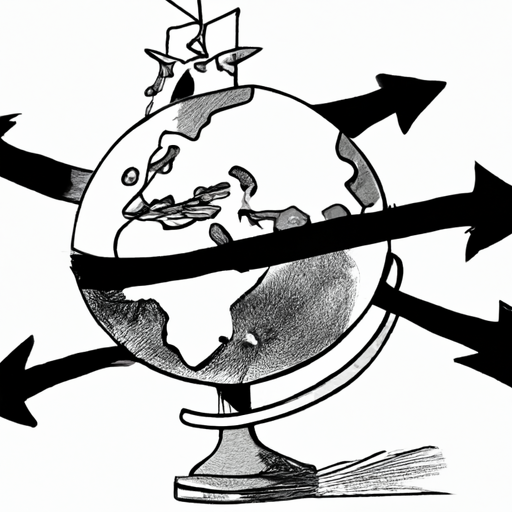Introduction to Extradition
How does extradition work? This is a question that’s often asked. Extradition can be a complex topic, regulated by multiple bilateral and multilateral treaties.
Extradition, at its core, is the legal process where one jurisdiction surrenders a person accused or convicted of committing a crime in another jurisdiction. This transfer serves the purpose of prosecution or punishment. The explanation of extradition is rooted in international cooperation against cross-border criminal activities.
The foundation for this process can be bilateral reciprocal agreements between two countries, multilateral agreements among multiple nations, or even regional alliances. For instance, within the European Union, a robust system of extradition laws exists, aiming at maintaining law and order across member states.
These agreements and laws embody the purpose of extradition: ensuring that individuals who commit crimes cannot evade justice by simply crossing borders. It reinforces the principle that crime should not pay, regardless of geographic boundaries.
Extradition Procedures
Understanding the extradition process involves dissecting its various steps and conditions. The procedural labyrinth of extradition is dictated not only by the legal frameworks in place but also by international agreements, domestic laws, and human rights considerations.
Requirements for Extradition
Extradition isn’t a simple transaction between nations. It strictly adheres to a set of criteria that determine its feasibility. These criteria or conditions for extradition serve as important safeguards to prevent misuse of the mechanism.
- Crime Not Purely Political: The alleged crime for which extradition is sought must not be a purely political offense. This distinction is crucial to ensure that the mechanism of extradition is not used as an instrument of political persecution. For example, charges related to espionage or treason are often considered political crimes.
- No Double Jeopardy: The principle of double jeopardy asserts that an individual cannot be tried twice for the same crime. If a person has already been acquitted or convicted for an alleged crime in one jurisdiction, they cannot be extradited to face trial for the same offense in another jurisdiction.
- Trial Not Conducted in Requested Country: A person cannot be extradited if they have already faced trial for the alleged crime in the country from which extradition is requested.
- Valid Legal Basis: The requesting country must provide a valid legal basis for the extradition request, often substantiated with substantial evidence supporting the allegations against the accused.
Interestingly, some countries impose additional requirements as part of their extradition procedures. These may include guarantees against torture or capital punishment in the receiving jurisdiction.
For instance, European Union countries mandate that no individual should be extradited if there’s a risk of them facing capital punishment in the requesting country.
Such conditions ensure that while international cooperation in tackling crime remains paramount, it does not supersede respect for human rights and principles of justice. These requirements reflect a balance between respecting state sovereignty, ensuring fair trials, and preventing potential human rights violations.
The complexities involved in meeting these requirements often explain why extradition processes can extend over prolonged periods. Legal battles ensue as attorneys navigate international and domestic laws, human rights considerations, and diplomatic relations—elements integral to understanding any extradition process.
In subsequent sections, we will discuss controversies surrounding these procedures and how different countries around the world approach extradition — shedding light on its universal facets and regional nuances.
Controversies Surrounding Extradition
Extradition, while integral to international law enforcement, is no stranger to controversy. The controversy often emerges when the accused stands to face harsher penalties in the receiving jurisdiction than they would in the requested country. An example that comes to mind is the case of Gary McKinnon, a British hacker who the United States accused of committing “the biggest military computer hack of all time.” Despite the U.S.’s extradition request, the UK Home Secretary blocked it, citing human rights concerns related to McKinnon’s health.
Human rights organizations are often at the forefront of these discussions, scrutinizing the fairness of legal systems across different countries. They argue that certain nations may not guarantee a fair trial or humane treatment to extradited individuals. For instance, Amnesty International has, on numerous occasions, highlighted concerns about extraditions to countries with a known record of torture or other human rights abuses.
Noteworthy also are high-profile cases that have ignited debates about sovereignty and the delicate balance between national interests and international cooperation. One such case is that of Julian Assange, founder of WikiLeaks. His potential extradition from the UK to the U.S. has been steeped in political implications and questions about press freedom.
The extradition process itself – which includes steps such as providing evidence of probable cause and evaluating criteria for extradition under laws like Article IV section 2 of the U.S. Constitution and Title 18, Sect. 3182 of the US Code – can also be a source of contention. Disputes arise when conditions for extradition are seen as unevenly applied or influenced by external factors beyond criminal justice.
These challenges underline that while extradition serves as a tool for cross-border justice, its application can be fraught with complexity and divergent perspectives.
Extradition Around the World
Extradition, as a process, is not confined to a singular jurisdiction but extends across nations. International extradition agreements facilitate this global reach.
Countries often form bilateral or multilateral extradition agreements that set the terms and conditions for extradition between them. For instance, the European Union employs the European Arrest Warrant system, enabling swift extradition processes among member states.
On a global scale, Interpol plays an instrumental role in coordinating efforts to apprehend fugitives. The organization supports member countries in tracing and arresting individuals sought for prosecution or to serve sentences.
Consider the United States, a country that exemplifies extensive international cooperation with its extradition treaties with over 100 countries. These treaties display a commitment to collaborative law enforcement and indicate broad acceptance of the principle of extradition.
Despite varying legal systems and principles of justice, these international agreements signify an effort to uphold accountability beyond borders. They embody international cooperation in addressing criminal offenses and ensuring justice is served.
While different jurisdictions have unique laws and regulations regarding extradition, these agreements demonstrate a shared dedication to combating cross-border crime.
The next section will delve into why extradition is such a pertinent issue among sovereign states, its role in tackling transnational crimes, and the controversies it can stir up.
Conclusion – How Does Extradition Work?
Extradition, a process involving the transfer of individuals accused or convicted of a crime from one jurisdiction to another, undeniably holds significant importance in the sphere of international law.
Being a sensitive issue between sovereigns, it necessitates careful balancing of interests, particularly when considering the potential for differing legal standards and penalties across jurisdictions. Despite this complexity, it plays an indispensable role in facilitating the prosecution or punishment of individuals who commit crimes across borders.
Despite controversies surrounding the fairness of certain legal systems and potential human rights concerns, extradition remains a key mechanism in international cooperation for addressing criminal offenses. This is evident in the numerous bilateral and multilateral agreements that countries form to ensure smooth execution of extradition processes.
While Interpol coordinates international efforts to apprehend fugitives, nations like the United States maintain extradition treaties with over 100 countries, reinforcing the global commitment to justice. In essence, extradition serves as an integral part in maintaining law and order in our increasingly interconnected world.
UK/US Extradition – How Does Extradition Work
Your Questions on How Does extradition Work
What is extradition and what is its purpose?
Extradition is the removal of a person from one jurisdiction to another for prosecution or punishment. It can be based on reciprocal agreements between countries or multilateral agreements. The European Union, for example, has a system of extradition laws.
What are the requirements for extradition?
Extradition will be granted only if the alleged crime is not a purely political offense, does not fall under double jeopardy, and is not already tried in the requested country. The requesting country must provide a valid legal basis for the extradition request. Some countries have additional requirements, such as guarantees against torture or capital punishment.
What are some controversies surrounding extradition?
Extradition can be controversial when the accused faces greater penalties in the receiving jurisdiction. Human rights organizations often raise concerns about the fairness of the legal systems in some countries. High-profile extradition cases have sparked debates about sovereignty and the balance between national interests and international cooperation.
How is extradition regulated internationally?
Many countries have bilateral or multilateral extradition agreements to facilitate the extradition process. Interpol plays a role in coordinating international efforts to apprehend fugitives. The United States, for instance, has extradition treaties with over 100 countries.
Why is extradition considered important?
Extradition is an important and sensitive issue between sovereigns. It allows for the prosecution or punishment of individuals who commit crimes across borders. While controversies exist, extradition serves as a mechanism for international cooperation in addressing criminal offenses.






